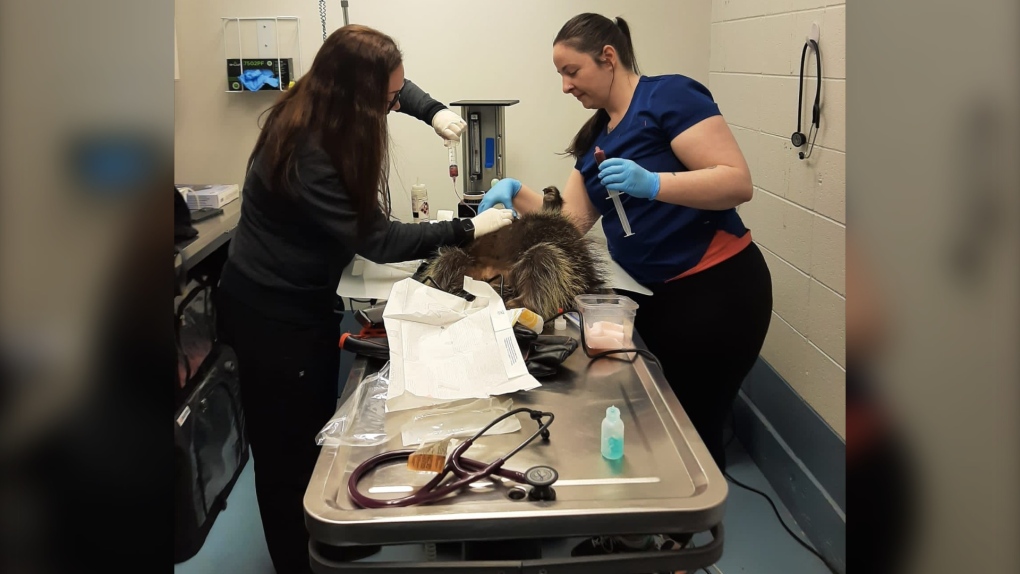'Stars all lined up perfectly': Edmonton wildlife rescue performs rare porcupine blood transfusion
Officials at a wildlife rescue and a rehabilitation centre in Edmonton believe they've performed the first successful porcupine blood transfusion in North America.
Several months ago, two injured female porcupines came into WILDNorth's care for different reasons. The larger one was attacked by a dog while the smaller one was described as "lethargic."
"We came to the conclusion that the smaller of the two porcupines was very, very ill, actually on its deathbed and the only way to save its life was to perform a blood transfusion," said Dale Gienow, executive director of WILDNorth.
Once the larger porcupine was stabilized and healed from its wounds, it became the donor for the smaller porcupine. The transfusion happened two weeks ago.
"We’re seeing her come full circle, a complete 180 [degrees]. She's now active, she's starting to climb, she's eating well on her own, all those things, so we’re very optimistic about her," Gienow said.
On Monday, the larger porcupine was released back into the wild where it was originally found, a full circle moment for Gienow who initially rescued it.
"It was a difficult rescue, this one's got a lot of attitude. She’s got lots of perseverance but now that it’s healed up again, we're excited to get her back into the wild where it belongs," he said.
THE PERFECT MATCH
Daren Mandrusiak with the Harvest Pointe Animal Hospital said to his knowledge, a blood transfusion between porcupines hasn’t been published in a medical journal or done before for several reasons.
"To find an individual porcupine who needs a blood transfusion is already rare enough, then to find one where you actually have a healthy blood donor like that is exceedingly rare," Mandrusiak told CTV News Edmonton.
Mandrusiak says the blood transfusion wouldn’t impact the larger porcupine's health and its opportunity of being released back where it was found.
 Staff at Harvest Pointe Animal Hospital perform a blood transfusion on a porcupine. (Credit: WILDNorth)
Staff at Harvest Pointe Animal Hospital perform a blood transfusion on a porcupine. (Credit: WILDNorth)
"The stars all lined up perfectly to allow this to happen for this little porcupine."
Mandrusiak says blood transfusions for animals are quite common but not in wildlife medicine because it can take a lot of resources, specific training and a donor which isn’t easy to come by.
There currently isn’t any information or research on blood physiology in porcupines, according to Mandrusiak.
Prior to the transfusion, cross matching was done to see if there would be any transfusion reaction as several things could go wrong.
"We could not be able to collect blood on the big porcupine … they have to be sedated. Getting such a large volume without having it clot is quite difficult," Mandrusiak said.
Gienow said the smaller porcupine will be staying in WILDNorth’s care for the next couple of weeks to monitor her health before they release her.
The rescue centre along with Harvest Pointe Animal Hospital plans to publish their work to a wildlife medical journal so the work is out there for others.
"Whether I’ll have a chance to do it again? Probably not. But I hope so, and if the opportunity ever comes I’ll know that it’s possible," Mandrusiak said.
CTVNews.ca Top Stories

Young people 'tortured' if stolen vehicle operations fail, Montreal police tell MPs
One day after a Montreal police officer fired gunshots at a suspect in a stolen vehicle, senior officers were telling parliamentarians that organized crime groups are recruiting people as young as 15 in the city to steal cars so that they can be shipped overseas.
B.C. judge orders shared dog custody for exes who both 'clearly love Stella'
In a first-of-its-kind ruling, a B.C. judge has awarded a former couple joint custody of their dog.
Man sets self on fire outside New York court where Trump trial underway
A man set himself on fire on Friday outside the New York courthouse where Donald Trump's historic hush-money trial was taking place as jury selection wrapped up, but officials said he did not appear to have been targeting Trump.
Sask. father found guilty of withholding daughter to prevent her from getting COVID-19 vaccine
Michael Gordon Jackson, a Saskatchewan man accused of abducting his daughter to prevent her from getting a COVID-19 vaccine, has been found guilty for contravention of a custody order.
Mandisa, Grammy award-winning 'American Idol' alum, dead at 47
Soulful gospel artist Mandisa, a Grammy-winning singer who got her start as a contestant on 'American Idol' in 2006, has died, according to a statement on her verified social media. She was 47.
She set out to find a husband in a year. Then she matched with a guy on a dating app on the other side of the world
Scottish comedian Samantha Hannah was working on a comedy show about finding a husband when Toby Hunter came into her life. What happened next surprised them both.
'It was joy': Trapped B.C. orca calf eats seal meat, putting rescue on hold
A rescue operation for an orca calf trapped in a remote tidal lagoon off Vancouver Island has been put on hold after it started eating seal meat thrown in the water for what is believed to be the first time.
Shivering for health: The myths and truths of ice baths explained
In a climate of social media-endorsed wellness rituals, plunging into cold water has promised to aid muscle recovery, enhance mental health and support immune system function. But the evidence of such benefits sits on thin ice, according to researchers.
'It could be catastrophic': Woman says natural supplement contained hidden painkiller drug
A Manitoba woman thought she found a miracle natural supplement, but said a hidden ingredient wreaked havoc on her health.
































